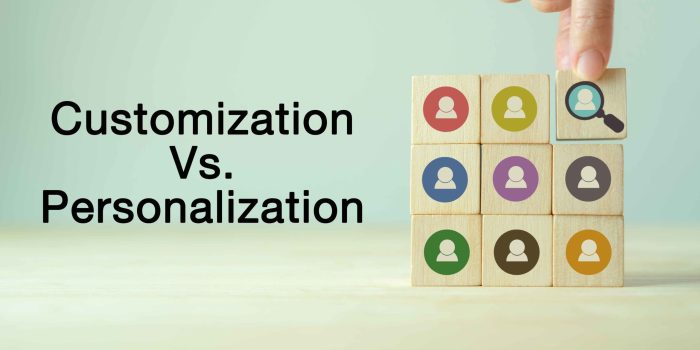
Personalization in service sets the stage for this enthralling narrative, offering readers a glimpse into a story that is rich in detail. In today’s competitive market, the ability to tailor services to meet individual customer needs is not just an option—it’s a necessity. Businesses across various sectors are discovering that personalized service can significantly enhance customer satisfaction, loyalty, and overall engagement.
From customer service to advertising and even human resources, personalization plays a crucial role in creating memorable experiences. Companies that adopt effective personalization strategies, leveraging technology and data analytics, can connect with their customers on a deeper level, ultimately driving success and fostering long-lasting relationships.
Understanding Personalization in Service
In the rapidly evolving landscape of modern business, personalization in service has emerged as a vital strategy. This approach focuses on tailoring services to meet individual customer preferences and needs, enhancing the overall experience. Personalization is not merely a trend; it has become a cornerstone for companies striving to build lasting relationships with their clients.Personalization can be categorized into various strategies, including demographic, behavioral, and contextual personalization.
Each of these strategies allows businesses to cater to specific segments of their customer base, utilizing insights gained from data analytics to refine and enhance service offerings. The significance of implementing personalization strategies extends beyond customer satisfaction; it leads to increased retention, higher engagement rates, and a stronger competitive edge in the market.
Types of Personalization Strategies
Businesses employ several types of personalization strategies to improve service delivery:
- Demographic Personalization: Tailoring services based on age, gender, location, and other demographic factors.
- Behavioral Personalization: Utilizing customer behavior data, such as purchase history and browsing patterns, to customize service offerings.
- Contextual Personalization: Adapting services based on the context of the interaction, such as time of day or location.
These strategies yield numerous benefits. Companies that prioritize personalization often experience improved customer loyalty and satisfaction, leading to repeat business and positive word-of-mouth referrals.
Personalization in Customer Service
The methods for personalizing customer interactions in service-oriented businesses are diverse and impactful. By understanding customer preferences and needs, companies can create tailored experiences that foster loyalty and satisfaction.One effective method is leveraging customer relationship management (CRM) systems to gather and analyze data. This technology enables businesses to track customer interactions and preferences, allowing for more relevant and engaging service offerings.
Companies like Amazon and Netflix have successfully implemented personalization in their customer service approach, providing recommendations based on user behavior that enhance the overall user experience.
Impact of Personalization on Customer Satisfaction

The influence of personalization on customer satisfaction and loyalty is profound. By providing tailored interactions, organizations can increase customer engagement and create a sense of value. This is notably evident in the following ways:
- Enhanced Customer Experience: Personalized interactions make customers feel valued and understood.
- Increased Loyalty: Customers are more likely to return to businesses that recognize and meet their specific needs.
- Higher Satisfaction Rates: Tailored services that cater to individual preferences lead to greater customer satisfaction.
Personalization in Business Accounting
In the realm of accounting, personalized services can significantly enhance the client experience. By understanding the unique financial goals and challenges of each client, accounting firms can deliver tailored solutions that resonate with their customers.Technology plays a crucial role in facilitating personalized accounting solutions. Cloud-based platforms and sophisticated accounting software provide businesses with tools to offer customized services seamlessly. However, maintaining personalization in a business accounting setting can be challenging due to regulatory requirements and the need for standardization.
Challenges of Maintaining Personalized Service
Despite the benefits, there are challenges associated with delivering personalized accounting services, including:
- Data Management: Ensuring that sensitive client information is handled securely while still allowing for personalized service.
- Consistency: Balancing personalization with the need for standardized processes can be difficult.
- Client Expectations: Managing varied client expectations regarding the level of personalization in service delivery.
Personalization in Business Advertising
Developing personalized advertising campaigns requires a strategic approach. The framework for creating effective personalized ads includes understanding target audiences, utilizing data analytics, and continually refining strategies based on performance insights.Data analytics is pivotal in crafting personalized advertising strategies. By analyzing consumer behavior and preferences, businesses can create targeted advertisements that resonate with individual customers. Brands like Spotify and Coca-Cola have excelled in personalized advertising, using consumer data to tailor their marketing messages effectively.
Brands Excelling in Personalized Advertising
Some brands that have effectively utilized personalized advertising strategies include:
- Spotify: Uses listening data to create personalized playlists and marketing campaigns.
- Coca-Cola: Engages customers through personalized bottle labels that feature individual names.
- Amazon: Implements product recommendations based on customer browsing and purchase history.
Personalization in Human Resources
In human resources, personalizing employee experiences is essential for improving engagement and productivity. Understanding individual employee needs allows HR departments to create a supportive work environment that fosters growth and satisfaction.To attract top talent, HR can personalize recruitment processes by tailoring job descriptions and utilizing targeted outreach strategies. This ensures that the right candidates are approached with relevant job opportunities and information.
Effects of Personalization in Employee Training
Personalization in employee training and development can lead to improved outcomes. By offering customized training programs, organizations can enhance skills and knowledge in ways that align with individual career aspirations.
- Increased Engagement: Personalized training programs are more likely to keep employees engaged.
- Higher Retention: Employees are less likely to leave organizations that invest in their professional development.
- Enhanced Skills Development: Tailored training leads to better skill acquisition and application in the workplace.
Personalization in Business Travel
The impact of personalization on business travel planning and management is significant. Corporate clients increasingly expect tailored travel solutions that cater to their specific needs and preferences.Technology assists in delivering personalized travel experiences through advanced booking systems and travel management tools. Companies like Expedia and Airbnb have successfully personalized their travel services, offering unique options based on user preferences and previous travel experiences.
Case Studies of Personalized Travel Services
Some companies that have successfully implemented personalization in their travel services include:
- Expedia: Offers personalized recommendations based on user search history and preferences.
- Airbnb: Provides tailored accommodation options by analyzing user preferences and past bookings.
- Travel Leaders Group: Focuses on personalized itineraries and travel experiences based on client needs.
Personalization in Business Branding
The role of personalization in strengthening brand identity cannot be understated. Creating personalized brand experiences for customers helps businesses stand out in a crowded marketplace.Strategies for creating these experiences include leveraging customer data to tailor interactions and ensuring consistency in brand messaging across all touchpoints. Successful brands often find a unique way to connect with their audience, reflecting their values and individuality.
Risks and Rewards of Personalizing Branding Efforts
While the rewards of personalizing branding efforts are considerable, they come with potential risks as well.
- Data Privacy Concerns: Customers may be wary of how their data is used for personalization.
- Brand Dilution: Over-personalization can lead to a loss of brand identity if not managed carefully.
- Resource Allocation: Personalized strategies can require significant resources and investment.
Personalization in Construction Industry
In the construction industry, personalization techniques can enhance customer interactions significantly. Tailoring communication and service offerings to meet client needs leads to improved satisfaction and project outcomes.Personalized project management can also contribute to increased client satisfaction. Understanding client preferences and expectations allows construction firms to deliver customized solutions, resulting in more successful projects.
Benefits of Personalized Service in Construction
The benefits of personalized service in client consultations and design processes include:
- Improved Communication: Personalized interactions enhance clarity and understanding between clients and contractors.
- Custom Solutions: Tailored services lead to unique designs that reflect client needs and preferences.
- Stronger Relationships: Building personal connections fosters trust and loyalty in client-contractor relationships.
Personalization in Entrepreneurialism
Entrepreneurs can leverage personalization to differentiate their offerings in a competitive market. By understanding their target audience and tailoring services, small businesses can create unique selling propositions that resonate with customers.Methods for personalizing service delivery in small businesses include offering customized products or services, implementing loyalty programs, and utilizing customer feedback to refine offerings.
Challenges Entrepreneurs May Face
However, personalizing services does come with challenges for entrepreneurs.
- Resource Constraints: Small businesses may lack the resources required for extensive data collection and analysis.
- Scalability: As businesses grow, maintaining a personalized approach can become difficult.
- Market Competition: Standing out in a crowded market requires continuous innovation and adaptation.
Personalization in Change Management
Personalization can significantly facilitate smoother transitions during organizational change. Tailoring communication and support to individual employee needs helps to mitigate resistance and foster acceptance.Identifying strategies for tailoring communication during change initiatives ensures that messages resonate with employees. Understanding individual needs is critical in navigating the complexities of change management.
Importance of Understanding Employee Needs

Recognizing individual employee needs during a change process can lead to a more successful transition.
- Increased Buy-in: Employees who feel their concerns are addressed are more likely to support changes.
- Effective Communication: Tailored messages enhance understanding and clarity about changes.
- Higher Engagement: Personalized support during transitions fosters greater employee engagement and morale.
Closing Summary
In conclusion, the journey through personalization in service reveals its transformative power in various industries. By understanding and implementing personalization strategies, businesses can not only meet but exceed customer expectations, leading to increased satisfaction and loyalty. As we move forward in an ever-evolving marketplace, those who embrace personalization will undoubtedly stand out and thrive amidst the competition.
FAQ Resource
What is personalization in service?
Personalization in service refers to tailoring service delivery to meet the individual preferences and needs of customers.
Why is personalization important in business?
It enhances customer satisfaction, loyalty, and can significantly improve a company’s competitive edge.
How can small businesses implement personalization?
Small businesses can use customer data to tailor interactions and services, improving the customer experience.
What are some examples of personalized customer service?
Examples include using customer names, recommending personalized products based on past purchases, and tailored communications.
What challenges might businesses face in personalizing services?
Challenges include gathering accurate customer data, maintaining privacy, and ensuring consistency in personalized service.





